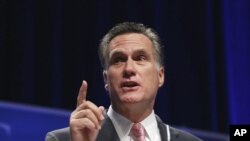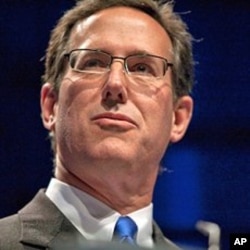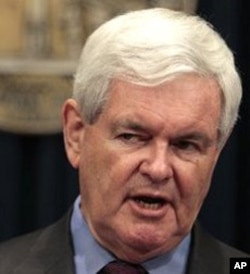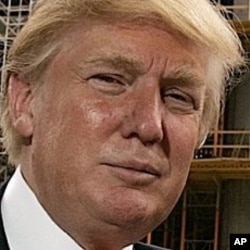In U.S. politics, the 2012 presidential election is more than a year away. But some Republicans with White House aspirations are beginning to eye the campaign trail.
You can add two more likely Republican Party challengers to the mix for 2012. Former Massachusetts Governor Mitt Romney and former Pennsylvania Senator Rick Santorum announced this week that they are forming presidential exploratory committees, a traditional first step toward a campaign for the White House.
Romney finished behind eventual Republican nominee John McCain in 2008, despite the fact that he was as able to raise more campaign contributions than McCain. Romney announced his initial step for 2012 in a video released by his campaign organization.
"I believe in America. I believe in the freedom and opportunity and the principles of our Constitution that have led us to become the greatest nation in the history of the Earth," he said. "This effort isn’t about a person. It is about the cause of American freedom and greatness."
Rick Santorum is less well known than Romney around the country. But he has a reputation for holding strong conservative views on social issues, including opposition to abortion and gay marriage.
By setting up exploratory committees, potential candidates can begin fundraising and gauge how easy or difficult it will be for them to raise the tens of millions of dollars necessary to compete in a U.S. presidential race.
Romney has been at or near the top in most recent public opinion polls and some analysts consider Romney the closest thing to a front-runner for the Republican Party’s presidential nomination at this very early point in the race.
"In the Republican tradition, Mitt Romney is the frontrunner simply because he has run before and come reasonably close to the nomination," said Larry Sabato, who directs the Center for Politics at the University of Virginia. "But he certainly is not a strong frontrunner. He didn’t make a great impression in 2008, and we don’t know who’s running for sure yet."
Other analysts see the Republican race for 2012 as wide open and predict a large field of contenders will eventually join the fray.
Already, former U.S. House of Representatives Speaker Newt Gingrich, former Minnesota Governor Tim Pawlenty and former Louisiana Governor Buddy Roemer have taken initial steps toward a run for the White House. Others expected to follow soon include Minnesota Representative Michele Bachmann and Mississippi Governor Haley Barbour.
But some well-known Republicans have so far shown little indication of getting into the race, including former Arkansas Governor Mike Huckabee and former Alaska Governor Sarah Palin. Palin was John McCain’s vice presidential running mate in 2008, and she retains a loyal following as a conservative television commentator.
One surprise in recent weeks has been the rise of New York real estate mogul and television celebrity Donald Trump in some of the opinion polls.
Trump has raised questions about President Barack Obama’s birth certificate, even though state officials in Hawaii confirmed its authenticity when Mr. Obama was a presidential candidate. Under the U.S. Constitution, only people born in the United States are eligible to become president, and so-called "birther" groups opposed to Mr. Obama continue to allege that he was born in Kenya.
With names like Romney, Trump, Huckabee and Gingrich near the top of most opinion surveys, experts say that better known contenders have an advantage in the early stages of the 2012 Republican race.
"We have a huge field of candidates," said John Fortier, who is with the Bipartisan Policy Center in Washington. "The ones who are at the top now are those who are best known and who have high name recognition. There are a few others who might make it into that final group, but it is a long process of sorting that out on the Republican side."
It is expected that most of those Republicans truly interested in running for president next year will formally announce their intentions in the next few months. Candidate debates are scheduled beginning next month in South Carolina. The first official test for the Republican field is scheduled for next February in the Iowa precinct caucuses.








